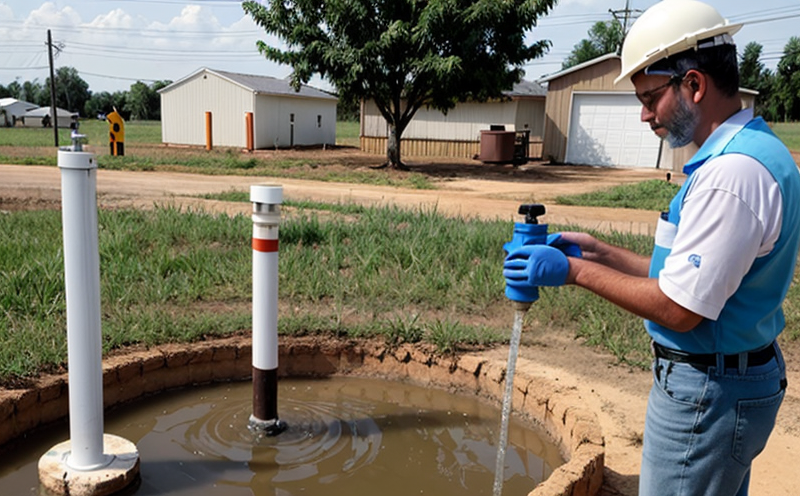ISO 13164-3 Uranium Isotope Testing in Groundwater
The ISO 13164 series of standards provides a comprehensive framework for the analysis and interpretation of uranium isotopic compositions in various environmental matrices, including groundwater. Uranium isotopes serve as powerful tracers to understand the source, age, and history of water flow within aquifers. This service focuses on the specific testing parameters outlined in ISO 13164-3, which deals with the measurement of uranium isotopic ratios (uranium-235/Uranium-238) using isotope ratio mass spectrometry.
The method described in this standard is essential for environmental scientists and regulatory bodies involved in groundwater quality assessment. By accurately measuring these isotopes, it helps to determine the degree of uranium contamination, evaluate natural versus anthropogenic sources, and assess the effectiveness of remediation efforts. This service is particularly valuable for stakeholders such as water utilities, government agencies responsible for water quality standards, and environmental consulting firms.
The process involves several key steps: first, groundwater samples are collected from designated monitoring wells or other representative points within the aquifer system. Preparing these samples requires careful handling to avoid contamination, which can skew results significantly. The sample must then be processed using a series of chemical separations and purification techniques to isolate uranium isotopes before they can undergo mass spectrometric analysis.
Once prepared, the samples are analyzed on high-precision isotope ratio mass spectrometers capable of detecting minute differences in atomic weights between isotopes. The precision and accuracy of these instruments ensure reliable data that meet stringent international standards. Post-analysis, results are interpreted according to ISO 13164 guidelines, which provide a framework for evaluating the isotopic composition relative to background levels or established thresholds.
Understanding uranium isotope ratios in groundwater is crucial for several reasons. It aids in identifying sources of contamination from industrial activities, agricultural runoff, or natural seepage into aquifers. Additionally, it assists regulatory bodies in setting appropriate standards and monitoring compliance with environmental regulations. In research settings, this information contributes to broader scientific knowledge about hydrogeological processes within specific regions.
By offering ISO 13164-3 Uranium Isotope Testing in Groundwater, our laboratory provides a robust analytical service tailored specifically towards addressing these critical needs. Our expertise lies not only in providing accurate measurements but also interpreting them within broader environmental contexts relevant to your organization's goals and objectives.
- Accurate measurement of uranium isotopic ratios using state-of-the-art instrumentation
- Comprehensive interpretation according to ISO 13164 guidelines
- Support for regulatory compliance through detailed reporting aligned with international standards
- Insight into the sources and ages of groundwater contamination
Why It Matters
The importance of accurate uranium isotope testing cannot be overstated, especially when dealing with groundwater quality. Uranium isotopes act as natural tracers that help track the movement of water through different geological layers and identify potential contamination hotspots.
Understanding these isotopic signatures allows for better management strategies aimed at protecting public health and ensuring sustainable use of resources. For instance, if elevated levels of uranium are detected in groundwater supplies, it could indicate a breach in containment systems or increased weathering rates from nearby uranium deposits. Such insights enable proactive measures to prevent further degradation of water quality.
Moreover, compliance with strict environmental regulations necessitates regular monitoring and assessment of uranium isotopic compositions. Agencies like the Environmental Protection Agency (EPA) set specific limits on allowable concentrations based on health risks associated with prolonged exposure to certain forms of uranium. Regular testing ensures ongoing adherence to these standards, thereby safeguarding both human populations and ecosystems dependent upon clean water sources.
From an economic perspective, early detection of issues through thorough isotopic analysis saves costs associated with more extensive remediation efforts later down the line. It also helps maintain reputation by demonstrating commitment to environmental stewardship among stakeholders including local communities, investors, and governing bodies.
- Detects contamination sources aiding in targeted interventions
- Supports regulatory compliance ensuring safe drinking water standards
- Promotes sustainable resource management practices
- Enhances reputation through transparent reporting of findings
Benefits
The benefits of ISO 13164-3 Uranium Isotope Testing in Groundwater extend beyond mere compliance with regulatory requirements; they encompass broader environmental and operational advantages:
- Improved Water Quality: Accurate identification and quantification of uranium isotopes help pinpoint areas requiring urgent attention, allowing for prompt corrective actions.
- Enhanced Decision-Making: Reliable data enables better informed decisions regarding resource allocation and prioritization of remediation projects.
- Cost Efficiency: Early detection reduces the likelihood of costly oversights or misallocations during remediation processes.
- Regulatory Compliance: Adherence to international standards ensures consistency with global best practices recognized by relevant authorities.
In summary, this testing methodology plays a pivotal role in maintaining high standards of environmental protection while fostering economic sustainability across various sectors reliant on groundwater resources.
Why Choose This Test
Selecting ISO 13164-3 Uranium Isotope Testing for Groundwater Quality Assessment offers numerous compelling reasons:
- Precision & Accuracy: Utilizing advanced isotope ratio mass spectrometers guarantees precise measurements, enhancing confidence in results.
- Comprehensive Interpretation: Our team of expert scientists provides detailed interpretations aligned with recognized international standards like ISO 13164.
- Regulatory Compliance: Ensures adherence to stringent environmental regulations by providing comprehensive reports meeting all necessary criteria.
- Proactive Approach: Identifying potential threats early allows for more effective prevention strategies and reduced long-term impacts.
This service not only meets but exceeds expectations set forth by industry leaders and regulatory bodies, making it an ideal choice for organizations committed to excellence in environmental management practices.





